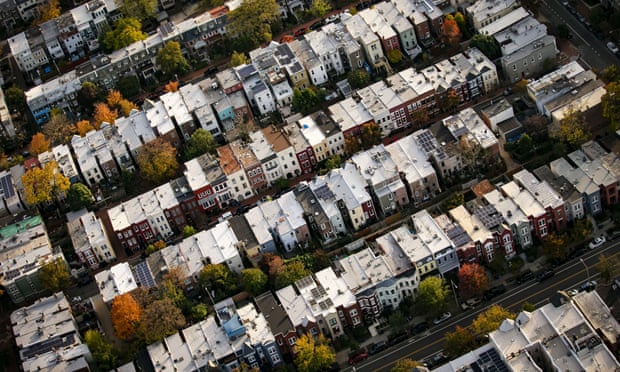by ARWA MAHDAWI

Capitalism is reshaping the property market, locking younger generations out of buying somewhere to live and expecting us to be happy about it
The year is 2070. Nobody owns a home any more; the concept of individuals possessing property has gone the way of the floppy disk. Instead, a few large corporations control all the world’s real estate and people “subscribe” to holistic housing solutions on their iPhone 78X in the same way they currently subscribe to Netflix. You can pay your monthly subscription in billionaire-backed cryptocurrency: BezosCoin, MuskCoin or ZuckCoin. If you default on your housing sub (nobody uses old-fashioned terms such as “rent” any more) you are dispatched to Mars to pay off your debt via indentured servitude in intergalactic Amazon warehouses.
I’m not saying that’s exactly how things are going to be in 50 years (the warehouses may well be on Jupiter), but, without major policy changes, it looks depressingly as though that’s the way the housing market is headed. That is thanks to a number of interconnected trends – the first of which is the proliferation of the corporate landlord. Ever since the last financial crisis, institutional investors such as private equity companies have been scooping up homes lost to foreclosure and reconfiguring the US housing market. A New York Times piece on the “$60bn housing grab by Wall Street” published last March noted that, before 2010, “institutional landlords didn’t exist in the single-family-rental market; now there are 25 to 30 of them”. The pandemic seems to have accelerated this corporate land grab. “If you sell a house these days, the buyer might be a pension fund,” the Wall Street Journal reported a couple of months ago. “Yield-chasing investors are snapping up single-family homes, competing with ordinary Americans and driving up prices.” The piece quoted a real-estate consultant who estimated that “roughly one in every five houses sold is bought by someone who never moves in”.
That Wall Street Journal article, I should note, didn’t get much traction when it first came out. However, it gained widespread attention last week after being mentioned in a viral Twitter thread accusing Blackrock and other investment firms of driving up house prices, which would mean that young families would not be able to build wealth. The housing market, as anyone who has looked at it recently knows, is absolutely bonkers. Globally, house prices are rising at their fastest rate since 2006, according to the Knight Frank global house price index. The US market, where demand massively outstrips supply, is so frenzied that one would-be purchaser reportedly offered to name their first-born child after the seller. They didn’t get the house. There are numerous reasons behind the massive rise in house prices – and everyone is looking for a convenient scapegoat. Blaming it entirely on Blackrock et al snapping up family homes, while tempting, is somewhat misguided. Rather, it is untrammelled capitalism that is to blame. But whoever’s fault it is, the consequence is the same: an increasing number of people, mostly young people, will be for ever locked out of homeownership.
Untrammelled capitalism isn’t just reshaping the housing market; more insidiously, it’s trying to rethink how we think about housing. I’d love to pretend that subscription-based housing was just a silly joke; alas, it’s a genuine business model a number of companies are working on – a natural evolution of the broader “sharing economy”. Perhaps the most pernicious thing about late-stage capitalism is the way in which it tries to convince us that not owning anything, not having any long-term security, is somehow liberating. Gig economy startups have helped erode labour laws while trying to persuade us that being a contractor with zero benefits, rather than an employee, is awesome. It means having flexibility! It means being your own boss! You might end up poor, but you’ll be following your passion! The same sort of lies are now being pushed on to us about housing. If I had a penny for every article that said “millennials prefer to rent” or “millennials don’t like owning anything”, I’d probably have a million dollars. Which would mean I might be able to buy a two-bedroom apartment one day. Unless, of course, Blackrock got there first.
The Guardian for more
